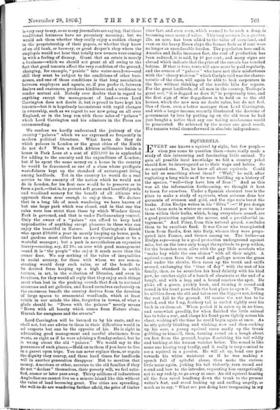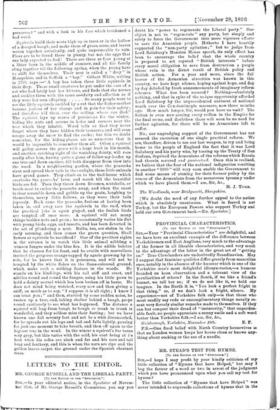SQUIRRELS.
VERY one knows a squirrel by sight, but few people—
when you come to question them—have really made a. study of this interesting and fascinating little animal. To gain all possible local knowledge we felt a country yokel should first be interrogated as to their ways and habits. So we accosted one. Yes, he knew all about squirrels. Could he tell us something about them ? "Well," he said, after cogitating a long while as if he were building up a history of the species, "well—they have lots of fleas ! " And as this was all the information forthcoming, we thought it best to learn for ourselves. Under a Spanish chestnut tree is the place to make a study of squirrels, when autumn dons her garments of crimson and gold, and the ripe nuts burst the husks. John Evelyn writes in his "Silva ":—" If you design to set these nuts in winter or autumn, I counsel you to inter them within their hulks, which, being everywhere armed, are a good protection against the mouse, and a providential in- tegument." And Pliny, from this natural guard, concludes them to be excellent food. It was Caesar who transplanted them from Sardis, first into Italy, whence they were propa- gated into France, and thence among us. The hulks—as Evelyn says—may be a good protection underground against mice, but on the trees only tempt the squirrels to peep within, for the branches seem alive with the gay little acrobats who "make hay while the sun shines" with all their might. A. squirrel comes from the wood and gallops across the grass and under the shrubs, then races up the trunk and sniffs around, exchanging the "time of day" with the rest of his family, then, as he scratches his head daintily with his hind paw, he catches sight of a bunch of chestnuts at the end of a, bough, and with a leap and a bound reaches the spot. He picks off a green, prickly husk, and turning it round and round in his front paws finds the best place to open it. Then he nibbles down the slit and takes out the biggest nut, letting the rest fall to the ground. Of course the nut has to be peeled, and the 1 ing, feathery tail is curled tightly over his back in excitement. When peeled it is eaten up in no time, and somewhat greedily, for when finished the little animal has to take a rest, and clasps his front paws tightly across his chest, wishing all the time he could begin again at once. As he sits quietly blinking and winking, now and then cocking up his ears, a young squirrel races madly up the trunk gobbling to himself, then, turning round on a bough about ten feet from the ground, begins flourishing his tail wildly and barking at the human watcher below. The sound is like some one kissing very loudly, and it really is very comical to see a squirrel in a passion. He will sit up, bend one paw towards his white waistcoat as if he was making a speech full of spiteful abuse, then make the curious little noise again, jerking his tail violently, turn round and round and bow to the intruder, requesting him energetically, not to say rudely, to go away at once. An old squirrel hearing all the fuss raced headlong down the trunk to the present writer's feet, and stood looking up and sniffing angrily, as much as to say," What arc you doing here trespassing in my preserves?" and with a look in his face which betokened a bad word.
Squirrels build their nests high up in trees or in the hollow of a decayed bough, and make them of grass, moss, and leaves woven together artistically, and quite impermeable to rain. Fleas are to be found there in plenty, but not the eggs that one lady expected to find! There are three or four young at a litter born in the middle of summer, and all the family cling together tiil the following spring, when the young have to shift for themselves. Their nest is called a drey " in Hampshire, and in Saffolk a "bay." Gilbert White, writing in 1769, says A boy has taken three little squirrels in their drey. These small creatures he put under the care of a cat who had lately lost her kittens, and finds that she nurses and suckles them with the same assiduity and affection as if
they were her own offspring So many people went to see the little squirrels suckled by a cat that the foster-mother became jealous of her charge and in pain for their safety ; and therefore hid them over the ceiling, where one died." The squirrel lays up stores of provisions for the winter, hiding the nuts and acorns in holes and corners near the tree which they inhabit. Wood tells us that they never forget where they have hidden their treasures, and will even scrape away the snow to find the cache; but this we doubt somewhat, for the hiding-places are so numerous that it would be impossible to remember them all. Often a squirrel will gallop across the grass with a huge husk in his month, and another, catching sight of the vanishing dainty, will race madly after him, having quite a game of follow-my-leader up one tree and down another, till both disappear from view into the wood. In a neighbouring garden, where the peacocks strut and spread their tails in the sunlight, these little animals have grand games. They climb on to the tool-house which overlooks the peacocks' lawn, and watch till the beautiful birds are fed. Then they throw down fir-cones, nutshells, or beech-mast to entice the peacocks away, and when the coast is clear scramble down and gobble up the grain, laughing to themselves, merry little fellows, as they wave their tails joyously. Back come the peacocks, furious at having been taken in, and away race the squirrels to the roof, when the practical joke is again played, and the foolish birds are tempted off once more. A squirrel will eat many things besides nuts and grain ; be occasionally varies his diet with young birds, eggs, and insects, and has been detected in the act of plundering a nest. Bulbs, too, are stolen in the early morning, and then comes the grave question, Shall flowers or squirrels be sacrificed ? One of the prettiest sights in the autumn is to watch this little animal nibbling a srimson fungus under the blue firs. It is the edible boletus that he chooses for his feast, and he avoids with marvellous instinct the gorgeous orange-capped fly agaric growing by its side, for he knows that it is poisonous, and will not be tempted by the white flakes on the flame-coloured ground, which make such a striking feature in the woods. He stands on his hind-legs, with his tail stiff and erect, and nibbles round and round the fungus, using his little paws to hold a dainty morsel which has been broken off in haste. He does not mind being watched, every now and then giving a sniff, as much as to say, "I suppose it is all right ; I know I can trust you ; " and then, startled by some sudden noise, he rushes up a tree, and, taking shelter behind a bough, peeps round cautiously to see what has happened. The distance a squirrel will leap from bough to bough or trunk to trunk is wonderful, and they seldom miss their footing; but we have known one fall seventy feet and not be a whit disconcerted, for he spreads out his legs and tail and falls lightly, pausing for just one moment to take breath, and then off again to the highest tree in the wood. In the winter a squirrel's fur turns very grey, but this varies with the cold, his coat being at its best when his sides are sleek and fat and his ears and tail long and feathery, and this is when the nuts are ripe and the golden leaves carpet the ground under the Spanish chestnut trees.











































 Previous page
Previous page